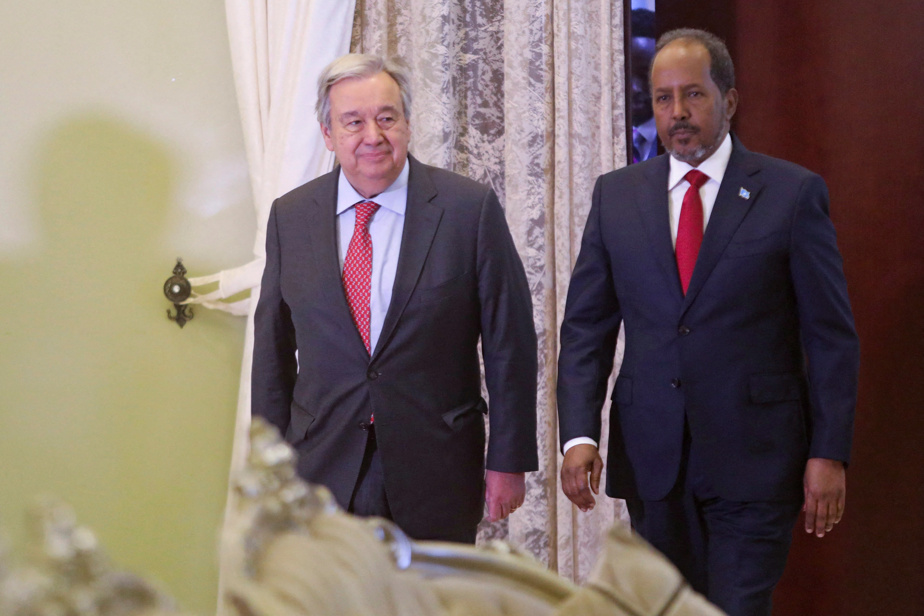(Mogadishu) UN Secretary-General Antonio Guterres “sounded the alarm” and called for a “massive” international mobilization in support of Somalia on Tuesday during a visit to the Horn of Africa country which fights the double threat of a historic drought and an Islamist insurgency.
“The combination of terrorism and drought, caused in large part by climate change, creates the perfect conditions (for a crisis) and requires massive support from the international community,” he said Tuesday afternoon. from the city of Baidoa (southwest).
The UN chief visited a camp for displaced people that hosts drought victims in this region among the hardest hit by hunger, which is also a stronghold of Al-Shabaab Islamists.
Upon his arrival Tuesday morning in the capital Mogadishu for this “solidarity visit”, he explained that he had come to “sound the alarm” about the country’s situation with the international community.
Somali President Hassan Sheikh Mohamoud welcomed the visit, which he said “shows that the United Nations is fully committed to supporting our plans for state building and stabilization of the country”.
The arrival of Mr. Guterres, who had already visited Somalia in March 2017, comes as the country faces a disastrous drought, the worst in at least four decades.
Five consecutive failed rainy seasons in parts of Somalia, as well as Kenya and Ethiopia, have wiped out livestock and crops and forced at least 1.7 million people from their homes in search of water and food.
About half of Somalia’s population will need humanitarian assistance this year, with 8.3 million people affected by drought, the UN estimates.
According to a study published in March by the Somali Ministry of Health, the World Health Organization and UNICEF, between 18,100 and 34,200 people could die from the consequences of the drought during the first six months of this year.
The UN has appealed for $2.6 billion in humanitarian aid for Somalia, which is only 15% funded. “The international community has been distracted by the drama of the Somali people,” he lamented.
Somalia was hit in 2011 by a famine that killed 260,000 people, more than half of them children under the age of six. In 2017, a new disaster was averted thanks to the rapid mobilization of the international community.
“Although Somalis are hardly contributing to climate change…they are among the biggest victims,” Guterres pointed out.
The UN chief and the Somali president also “discussed the valuable efforts of the government to fight terrorism and advance peace and security for all”, he stressed.
Returning to power in May 2022, Hassan Cheikh Mohamoud declared “total war” on Shabab, an Al-Qaeda-affiliated group that has been waging a bloody insurgency against the internationally-backed government since 2007.
The Somali president sent troops in September to support local clan militias who had risen against them in the center of the country.
In recent months, the army and these militias known as “macawisley” have retaken large swathes of territory from Al-Shabaab, in an operation supported by the African Union force in Somalia (Atmis) and American airstrikes .
The government claimed in late March that more than 3,000 Shebab fighters had been killed since the start of the offensive. And according to the Ministry of Information, 70 towns and villages have been “liberated”.
This information is impossible to verify independently.
Despite these setbacks, the Al-Shabaab have regularly carried out deadly attacks, underscoring their ability to strike at the heart of Somali cities and military installations against civilian, political and military targets despite government advances.
In a report to the UN Security Council in February, Antonio Guterres said 2022 had been the deadliest year for civilians in Somalia since 2017, largely due to Al-Shabaab attacks.

